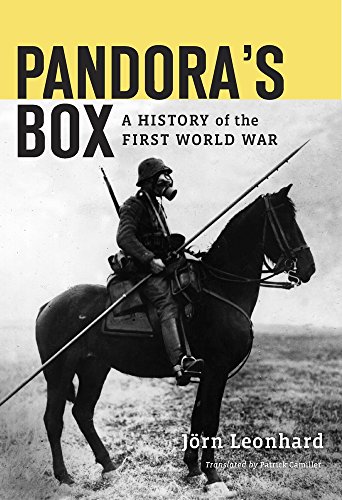Pandora's Box: A History of the First World War by Jörn Leonhard
/Pandora's Box: A History of the First World War
by Jörn Leonhard
translated from the German by Patrick Camiller
The Belknap Press of Harvard University Press, 2018
Jörn Leonhard's mammoth 2014 book Die Büchse der Pandora: Geschichte des Ersten Weltkriegs now has an English-language translation by Patrick Camiller published by the Belknap Press. Leonhard, European History professor at the great University of Freiburg, presents a stunningly broad and detailed survey of the cataclysm that began the 20th century by first tracing its deep roots in the 19th century and searching out the conflict's furthest ripples. “The First World War did more than usher in a new phase of colonization and decolonization for Europe,” he writes. “Equally important were the worldwide mobilization of manpower and raw materials, the various migration flows, and the wartime experiences of colonial societies outside Europe.”
Pandora's Box: A History of the First World War is a steep read, even in English. Leonhard here doesn't spend much time delivering the kind of reader-friendly sequential narrative that's been done so well by historians like John Keegan or Martin Gilbert; rather, he's much more concerned with presenting a deeply detailed panoramic along the lines of writers like Hew Strachan or Adam Tooze – caveat lector, obviously, but the reading experience is nevertheless thrilling, particularly as the facts accumulate and gradually create a crushing realization of how fundamentally the war changed the world – indeed, some of these changes are so sweeping when diagnosed by Leonhard that they make the battlefield bloodshed central to most WWI histories seem almost beside the point. “The world war,” for instance, “fundamentally changed people's time-consciousness … Expectations and experience differed more and more widely between the military front and the home front, and they could no longer be straightforwardly synchronized with each other.”
As Leonhard demonstrates, the war also commenced the shattering of the myth of European centrality. After 1917, “the promise of new models of political and social order no longer appeared to come from western or central Europe, but rather from Russia and eastern Europe and the other side of the Atlantic: Vladimir Ilyich Lenin and Woodrow Wilson symbolized these imagined futures.” These are just two of the long-term multi-part upheavals Leonhard traces throughout his book, and they put the whole conflict in a broader context than any historian has managed in a single volume in well over a generation.
Pandora's Box has an austere sheen to it, something that Patrick Camiller has wisely left intact in this enormously impressive undertaking. Intrepid readers with marathon capabilities but no German will be richly rewarded.
Steve Donoghue was a founding editor of Open Letters Monthly. His book criticism has appeared in the Boston Globe, the Wall Street Journal, and the American Conservative. He writes regularly for the National, the Washington Post, the Vineyard Gazette, and the Christian Science Monitor. His website is http://www.stevedonoghue.com.
